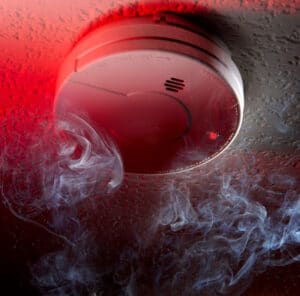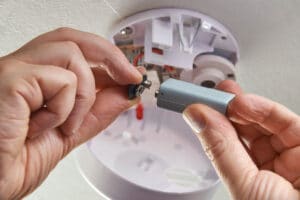
If you and your family live in a home with working fire alarms, your chances of surviving a fire and escaping to safety increase by 50% thanks to the early warning these important devices provide. In the world of fire safety, smoke alarms are the life saving success story of the past 30 years and a must-have for every residential and commercial space.
Today’s smoke alarms save lives by notifying occupants of the presence of a threatening fire with a loud wail or repetitive beep, and detect smoke through one of two types of sensors –
-Ionization sensors are generally more effective at sensing small smoke particles, which tend to result from hot, flaming fires.
-Photoelectric sensors are generally more effective at sensing large smoke particles, which usually result from long, smoldering fires.
The highest tech smoke alarms also feature advanced smart technology that can pair to your smart phone for added features and benefits. These alarms can not only sound an alarm to alert residents of danger, but send a notification to your phone when smoke or fire is detected. They can even tell you when they are damaged or if their batteries are in need of replacement.
To ensure the greatest safety for occupants, the National Fire Protection Association recommends that homes have both Ionization sensor and Photoelectric sensor alarms in place to provide the highest level of protection. For maximum coverage, smoke alarms should be placed on each level of your home, including the basement, inside each sleeping area, and outside all sleeping areas.

In order to keep your alarms working effectively, remove dust and debris from outside each alarm with a vacuum cleaner attachment regularly, perform routine tests of all alarms at least monthly, keep batteries fresh by changing them twice a year, and replace the alarms in your home at least every 10 years.
Smoke alarms save lives. On average, home fire statistics show that 40% of all deaths that occur in home fires happen when no smoke detectors are present, and 25% happen when detectors are present but fail because of dead or disconnected batteries.
Other essential fire safety tips for you and your family include –
Plan your escape route. Have a plan and make sure everyone knows the plan. Your plan should include at least two unobstructed exits (including windows) and you should practice the plan at least twice a year.
Use electricity safely. Never overload outlets or power strips and if you see smoke or detect an unusual smell, unplug the device and have it serviced or replaced.
Give space heaters space. Keep portable heaters and space heaters at least three feet away from anything that can burn, always keep children and pets away from heaters, and never leave them unattended.
Go low under smoke. If you need to escape through smoke, crawl on your hands and knees and keep your head 12 to 24 inches above the floor.
Stop, drop and roll. If your clothes catch fire, never run. Instead, stop, drop to the ground, cover your face with your hands and roll until the flames are smothered.
On average, nearly 3,000 people die each year in fires. Working smoke alarms can help cut that number by 50%. Make sure your home is protected so you give yourself and your family the best chance to get the early detection needed to execute your escape plan and get out alive.’